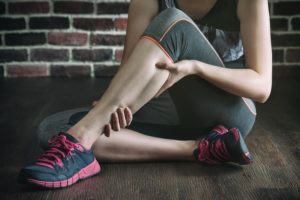
Most people recognize varicose veins as those long, twisted, bulging veins in the thighs or calves. The truth is, varicose veins don’t start out like this. Initially, the pooling of blood within one or more veins may cause seemingly unexplainable symptoms such as aching, itching, and, you guessed it, leg cramps.
Why Varicose Veins May Cause Leg Cramps
As you go about your normal daily activities, your body is naturally contracting certain muscles. The muscles in the feet, legs, and even your core contract so instinctively with routine motions that you may not even notice them at work. When you are not performing physical activities, these muscles should relax easily. For some people, this state of muscle relaxation doesn’t happen as it should. This inability can lead to full-on cramps.
Calf muscles, in particular, are involved in the circulation of blood from the feet and lower leg up to the thigh and back to the heart. Varicose veins indicate that this circulation has been compromised, and that blood is pooling rather than flowing. Without sufficient blood flow through them, the muscles of the legs are less likely to reach a full state of relaxation, making them more prone to cramping.
In addition to cramping and general muscle tension in the legs, early indicators of varicose veins may include a throbbing or burning sensation, swollen feet or ankles, leg fatigue, and slight discoloration of the skin on the lower leg. Symptoms may not occur persistently and may be triggered by specific factors, such as standing for an extended period.
Are Varicose Veins Always to Blame?
Varicose veins increase the potential for leg cramps, but there are additional reasons why cramps may occur frequently. Strategies to help you identify the potential cause of leg cramps may include drinking more water and resting with your legs elevated. Dehydration is a common reason behind leg cramps because, without sufficient fluid intake, the body’s delicate balance of electrolytes may get disrupted.
If you have explored non-vein-related reasons for leg cramps and continue to experience this uncomfortable symptom, contact your LA vein specialist for assistance. A consultation with Dr. Lee can identify the presence of varicose veins and their role in leg cramps.
Schedule your consultation at (818) 325-0400.

